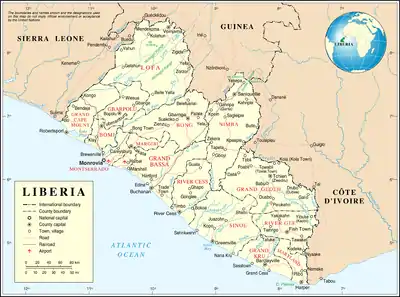United Nations Security Council Resolution 1071
United Nations Security Council resolution 1071, adopted unanimously on 30 August 1996, after recalling all resolutions on the situation in Liberia, particularly Resolution 1059 (1996), the Council extended the mandate of the United Nations Observer Mission in Liberia (UNOMIL) until 30 November 1996 and discussed matters relating to UNOMIL.[1]
| UN Security Council Resolution 1071 | ||
|---|---|---|
 Liberia | ||
| Date | 30 August 1996 | |
| Meeting no. | 3,694 | |
| Code | S/RES/1071 (Document) | |
| Subject | The situation in Liberia | |
Voting summary |
| |
| Result | Adopted | |
| Security Council composition | ||
Permanent members | ||
Non-permanent members | ||
| ||
The Council welcomed the restoration of the capital Monrovia as a safe haven. Ultimately, the Liberian people and their leaders were primarily responsible for peace and reconciliation.
After extending the mandate of UNOMIL until 30 November 1996, it was also noted that the Economic Community of West African States (ECOWAS) had agreed to extend the Abuja Agreement until 15 June 1997, established a timetable for implementation of the agreement, adopted a mechanism to verify compliance by faction leaders and discussed possible measures against the factions in the event of noncompliance.[2] All attacks on the Economic Community of West African States Monitoring Group (ECOMOG), the ECOWAS peacekeeping force in Liberia, aid agencies and UNOMIL were condemned.
The council proceeded to condemn the use of child soldiers and urged the respect of human rights. All states were instructed to strictly observe the arms embargo imposed on the country in Resolution 788 (1992) and report violations to the committee established in Resolution 985 (1995).
See also
References
- "Security Council extends mandate of UNOMIL through 30 November, calls on Liberian factions to honour agreements". United Nations. 30 August 1996.
- Askari, Hossein (2003). Economic sanctions: examining their philosophy and efficacy. Greenwood Publishing Group. p. 52. ISBN 978-1-56720-542-8.
External links
 Works related to United Nations Security Council Resolution 1071 at Wikisource
Works related to United Nations Security Council Resolution 1071 at Wikisource- Text of the Resolution at undocs.org